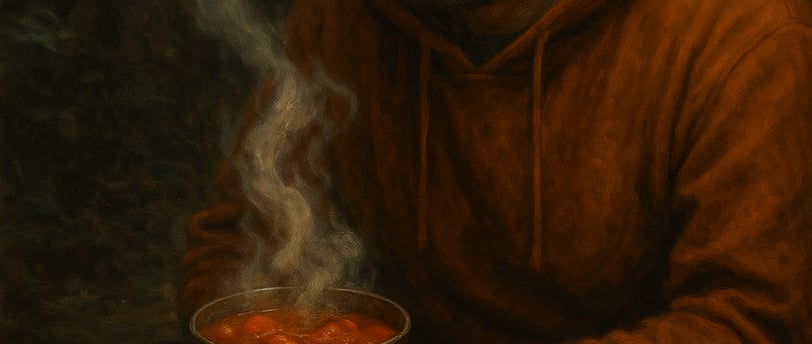Chapter 7. Seed’s Secret Tin Can Post-Apocalyptic Tomato Soup
In a world where cooking, gardening, and music are outlawed, Seed brews a forbidden tomato soup deep in the forest—only when Home Grown Tomatoes by John Denver plays through the static. The song, now sacred, guides exiles back to the old ways. The soup, made with foraged ingredients and stirred by memory, becomes a quiet act of rebellion. Each spoonful is a prayer. Each note, a call home.
THE TIN CAN AND THE TOMATO GARDEN
Keith Kalm
7/3/20252 min read


"Chapter 7. Seed's Secret Tin Can Post Apocalyptic Tomato Soup recipe, which can only be prepared while listening to John Denver's Home Grown Tomatoes over the ethers , all of which is all deemed illegal, music, growing your own food, and cooking. John Denver songs inspired those seeking refuge in the forest during the collapse, and he became legend and a profit, his words immortalized. People began to listen. To follow the path to what once was, all on their journey to find their way back home. "
Chapter 7. Seed’s Secret Tin Can Post-Apocalyptic Tomato Soup
They say you can still hear it, sometimes—soft and warbled—floating between the trees, caught in the static hum of the wind, the sound of John Denver singing Home Grown Tomatoes. Not from any speaker, no—not since the Grid outlawed melody, farming, and flame—but from the memories of the forest itself. The music clings to the oaks and pines like lichen. The song became gospel. And gospel, in these times, could get you killed.
Seed had the last known copy of the track embedded in the grooves of an old tin can. Not a USB, not a vinyl—an actual can. Tomato, of course. The label long gone, but if you held it just right, and the sun hit the dents perfectly, you’d see etchings… a kind of map… or a recipe… or both. No one ever knew for sure except Seed. And he wasn’t talking.
The law said no gardening. No open fires. No music older than twenty years, and nothing acoustic. And yet, in the deepest woods of what once was Pennsylvania, under the moss canopy and beside the old stream Willow loved to splash in, Seed would sit by his burn barrel—illegal, sacred—and brew up the soup that reminded the Lost what home used to taste like.
The Ingredients (spoken aloud, not written down):
– 7 foraged tomatoes, never store-bought, sun-kissed and scarred
– 1 wild onion, stolen from the ruins of a forgotten garden
– A palmful of salt from the last open barter line before it fell
– Cracked peppercorns (smuggled in a child's boot across the border)
– Ashes of basil leaves, burned ceremoniously
– Rainwater, caught during a full moon
– One tin can, for listening, not cooking
The cooking could only begin when the first chorus hit. Not before. Not after. That’s what the old ones taught, the Denverites, the quiet sect of refugees who followed lyrics like scripture and sang in whispers through the green shadows. Seed had learned from them, from a woman with tangled hair and a voice like pine needles brushing denim. She taught him to cook with reverence, not recipes. The soup wasn’t just survival—it was resistance.
As the fire hissed and the soup simmered, the tin can—dangling from a hemp string over the flame—would begin to hum. It wasn’t music, not exactly, but it made Willow’s ears perk and Seed’s spine settle. The soup would bubble to the rhythm of freedom, every note of Denver’s outlaw hymn stirring into the red, into memory, into prophecy.
No one knew when the soup would be served again. No one but Seed. And those lucky enough to sip it would dream of warm gardens, old songs, and fireflies flickering above soft earth. They’d remember what it meant to be free.
And for a moment, in that hidden patch of forest, among rebels and runaways, with the world still burning around them…
They were already home.
